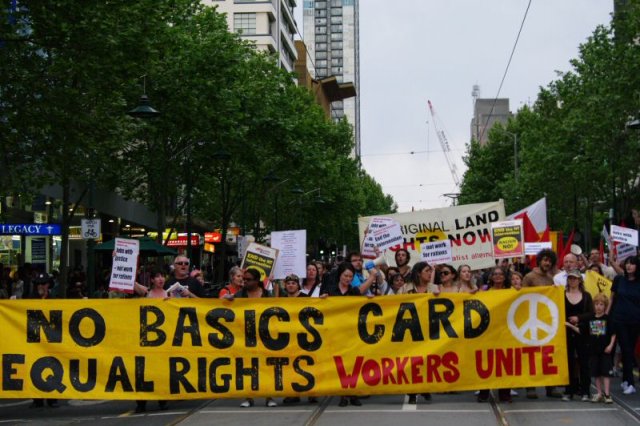
The federal government has begun “trials” of a controversial new plan for compulsory income management in five places around Australia. This policy began in the Northern Territory as part of the "NT intervention" in 2007, but is now expanding into other states and territories.
Under the policy, people deemed “vulnerable” by Centrelink will have access to a portion of their payment through a “Basics card” that can only be used on certain items and stores. The policy is concerning for a range of reasons: it isn't proven to help people manage their income, it could be used to target minorities and it violates the civil liberties of welfare recipients.
Those of us on welfare should be concerned about compulsory income management, but all attacks on welfare should be a concern for all of us, and not just to be good neighbours.
Welfare is part of the fabric of our society — it is good that it exists, even if you never use it. The existence of welfare helps you get better pay at work. If there is a healthy welfare system that will support you and your family, you’re much less likely to put up with being exploited by your boss or accept low pay.
It means if something does go wrong and you lose your job, adequate welfare means you won’t get stuck in whatever job comes along just to pay the bills, instead you can take the time to find adequate employment, or retrain to get into another industry. It means that you are in a better position to decide when you'll go back to work after an injury.
An attack on welfare, whether it be reducing payments or introducing controlling and demeaning conditions such as the Basics card, is an attack on working conditions for all of us.
The rate of Newstart allowance for those looking for work has dropped drastically in the past 20 years. It is currently 33% below the poverty line and is only 65% the rate of the pension, making it almost impossible to live on.
An article in The Conversation in August this year reported that “In 1996, a single unemployed person would have received an income that was about $14 a week (in 2010 values) less than a person in the 10th percentile of the overall income distribution. In 2009-10 they would have been $116 a week below a person in the 10th percentile.”
To argue that Newstart should be set low to encourage people to find work faster is not based in reality. Newstart is so low that it has actually become a barrier to employment, meaning that it forces people in such deep poverty that they can’t afford travel to attend appointments or buy clothes for job interviews. They may also develop mental health problems that mean they give up looking for work.
Knowing that you might face this level of poverty might make employed people less likely to push for the raise you deserve or to stop work to fix a safety problem in the workplace, for fear of upsetting the boss.
So even if a person never uses welfare, having it there makes your life easier. If you're one of the majority of us that have to work for a living, any attack on the rights of welfare recipients are an attack on your rights as well. As it is, welfare is set below the poverty line and this undermines welfare’s important role.
The reality is in a modern economy at least between 5-10% of the population will be unemployed at any time. In the current global economic crisis, many countries have even higher unemployment rates. Having a section of the population unemployed makes it easier for businesses to hire and fire staff when they want, and the threat of unemployment can keep wages low.
Is it right that people who happen to fall into the portion of the population excluded from work should be dropped into poverty? And beyond that, should they then be punished again by having to go through humiliating processes like compulsory income management?
Attacks on welfare such as compulsory income management are a problem for all of us. Most of us might not immediately depend on welfare at any one point but welfare is an important part of our society. This is something that was won by struggle of the working class and poor people.
Welfare wasn't just given by a benevolent government. During the great depression of the 1930s groups like the Unemployed Workers Movement (led by the Communist Party) fought for and won welfare rights so no one would have to live in extreme poverty. To lose this protection reverses this very important gain.
We should aim for full employment, where everyone who is able and willing to contribute can. If we shared the work around to everyone we could drastically reduce the work week, allowing us to all have more time to spend with our friends and families.
But as long as unemployment does exist we need to fight for the rights of those forced onto welfare. Just because someone is unemployed, does not mean someone is less deserving of a decent standard of living, or should have less rights and respect than the rest of our society.
To enjoy a better world, we need to defend welfare. That means welfare recipients should be able to count on us to help defend them.
Read more articles from Resistance here.